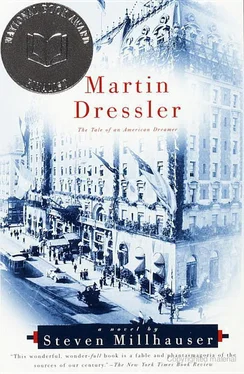MARTIN SAT IN A CORNER OF THE ROOF GARDEN of the New Dressler, in a gazebo striped with sun and shade, and raised to his eyes a pair of Jena field glasses. He had ordered the glasses from a German optical company, which advertised a finish of bright black enamel on all metal parts, high-power achromatic lenses ground from special optical glass manufactured in the Jena glass factory, and a covering of fine-grade morocco leather. Through the high-power lenses he directed his gaze eight blocks north toward a group of workmen who were standing near a heavy mat draped over a group of boulders in a deep excavation. They were blasting deeper, day after day, far down, for the new building was to have twelve underground levels and a basement; the consulting engineers had said it could be done. Aboveground the building would rise thirty stories, surpassing the New Dressler not merely in size but in every other way, for Martin had leaped beyond the idea of a hotel to something quite new. The leap had been greeted coldly by Lellyveld, who had refused to support the project unless Martin agreed to grant Lellyveld and White a forty percent interest in the building and the power to appoint the head of accounting — a deal strongly opposed by Rudolf Arling on the ground that Lellyveld wanted to gain control of the Cosmosarium and infect it with his mediocrity. Martin accepted Lellyveld’s offer instantly.
He could no longer discuss such matters with Emmeline, who after the inept shooting had resigned her position at the New Dressler to devote herself entirely to the care of Caroline. He had counted on her to return, after a short rest, but it became clear that a change had come over Emmeline: she refused to be alone with Martin, scarcely permitted herself to look at him, and so thoroughly played the part of the guilty woman taken in adultery that he became uneasy and irritable in her presence. As for Caroline, who confessed that the gun had come from Claire Moore in the days of their friendship, for Claire Moore believed in a woman’s right to self-protection, the shot had served to jolt her from her sofa-grave; she had returned to her apartment and her marriage bed as if she had come home from a little vacation at the seaside, with a touch of color and a handful of shells. But Martin, who was not unhappy to see an end to the sofa nonsense, felt a slight heaviness in the air of the apartment, now that Caroline had returned. Caroline alone, Caroline without the promise of Emmeline, was a quiet darkening of the air, a delicate and fine-dropped rain, lightly falling. More and more he found himself lingering in his rooms in the New Dressler, one of which he supplied with a bed. At first he had walked down to the Vernons for dinner each evening, with the old pleasurable sense that he was visiting them as a group, was somehow courting them all over again, but Emmeline’s fussy and over-anxious attendance on Caroline, Margaret’s habit of handling her pearls or fiddling with her dress sleeve as she glanced idly around the room, Caroline’s murmured sentences punctuated by long silences, all this grated on his nerves. He began working in his rooms through dinner or taking his meals alone at the New Dressler, so that he found himself eating with the Vernons only once or twice a week.
And Martin was busy: as the excavation deepened, as carpenters began to construct wooden forms for the foundation walls, he moved about the city, visiting art museums, waxwork museums, dime museums that displayed four-legged chickens and bearded ladies, the new nickelodeon parlors with rows of hand-cranked machines, photograph studios, scientific exhibitions, fortunetelling parlors, the mezzanines of public buildings where he looked down at patterns of people moving in parallelograms of light cast by great windows — and one day, up at the building site, a row of cement trucks with revolving drums stopped one after another beside an open space in the hoarding. All over the city, workmen were breaking up streets. Martin liked to stand on boards thrown across torn-up avenues and peer into deep ditches heaped with rubble; sometimes he could see the arch of a subway tunnel. It pleased him that the city was going underground, that even as it strained higher and higher it was smashing its way through avenues and burrowing through blackness; and Martin imagined a new city growing beneath the city, a vast and glimmering under-city, with avenues and department stores and railroad tracks stretching away in every direction.
One day not long after the new building had begun to rise above street level, Martin decided to pay a visit to the old Bellingham Hotel. He hadn’t been down that way in more than a year. He had been thinking lately of Marie Haskova; perhaps she would like a job in one of his buildings, he wondered why he hadn’t thought of it before. The idea pleased him, even excited him; he wondered how she was getting along, he hadn’t really treated her very well, after all she had been a kind of friend, even if their friendship had been ambiguous from the start. As Martin walked down Riverside toward his old street he recalled his wedding night, the sharp-turning stair-flights dropping away, the dark corridor lit by dim gas-jets, her weary startled eyes. She had taken him by the arm, she had led him in. Had he married her that night? Then his other marriage was only a dream-marriage, and Marie Haskova was his bride. He tried to remember the way she looked, the swift sad smile, the slight bitterness about the mouth. It all seemed long ago, more distant than his Sunday walks with his mother to Madison Square Park. In the warm air that smelled of asphalt and riverwater Martin turned onto his old street. He saw at once that he had made a mistake, he had turned onto a different street, and that was strange, it was downright baffling, because he never made mistakes like that, surely he hadn’t forgotten the number of his old street. And even as he stood puzzling it out, looking about and frowning in the bright sunlight, he felt ripples of anxiety passing across his stomach, for already his stomach knew what he himself was only beginning to realize. No, he hadn’t made a mistake, it was his old street sure enough, but the Bellingham was no longer there. In its place stood a line of five-story row houses with wrought-iron balconies and street-level front doors. He walked up the cut-stone sidewalk, looking at the doors with their brass knockers and electric bells, and an absurd idea came to him: behind one of those doors was the old Bellingham Hotel, with the little parlor off the main lobby. He became aware of someone looking down at him from an upper window and he walked quickly past. The Bellingham had simply vanished. That was the way of things in New York: they were there one day and gone the next. Even as his new building rose story by story it was already vanishing, the trajectory of the wrecker’s ball had been set in motion as the blade of the first bulldozer bit into the earth. And as Martin turned the corner he seemed to hear, in the warm air, a sound of crumbling masonry, he seemed to see, in the summer light, a faint dust of old buildings sifting down.
A fear came over him that the old Vanderlyn was gone, even though he had walked past it not three weeks ago. In its place he saw a heap of rubble, with Mr. Westerhoven’s rubbers sticking out. But when he arrived, the Vanderlyn was still there. At lunch Walter Dundee complained that motorcars were worse than the El trains when it came to scaring horses. Only the other day he had seen a drayhorse start up, toppling a barrel onto the street. Martin saw the horse in Harwinton’s ad, the bright red coal burning in its back, the eyes wild with terror. Dundee’s blue eyes were sharp, but the skin of his neck was slack, and there was an occasional note of disapproval in his voice; he spoke of retiring soon, fixing up a house he had his eye on, out in Brooklyn. He asked Martin in a reserved way how the new building was coming along. He asked after Martin’s wife. And a restlessness came over Martin, through the smoky air he glanced at the clock, somewhere a woman began to laugh, a little rippling phrase that rose in a series of four notes and repeated itself, over and over again, and Martin became enraged: what was so funny, why couldn’t she stop laughing like that? But when Dundee set down his empty beer glass streaked with foam and said he ought to be getting back, Martin felt a desire to hold him there, surely it wasn’t necessary to rush away, they had barely begun to talk. But Dundee had already risen to his feet. “Take care of yourself, Martin,” he then said, holding out his hand, and Martin was moved: after all, they had once been partners, even though a lot of water had flowed under the bridge since then. And at the phrase, which he thought distinctly, an image of the great bridge rose up, as he stood by the rail of the ferry with the spray in his face and looked up at the sunny arches, the swoop of the cables, and the dark bridge-pier, sun-striped, where gulls flew in and out of light and shade.
Читать дальше












